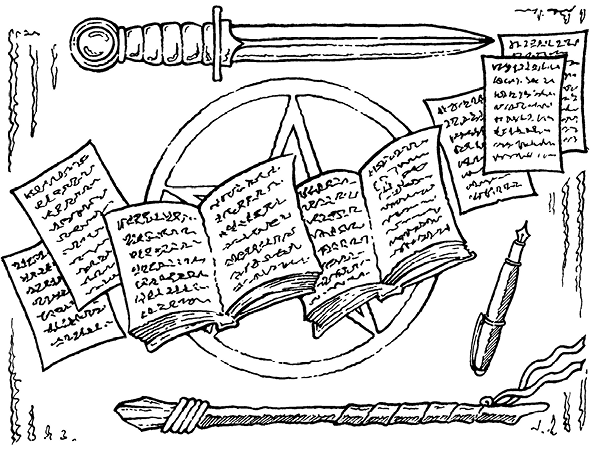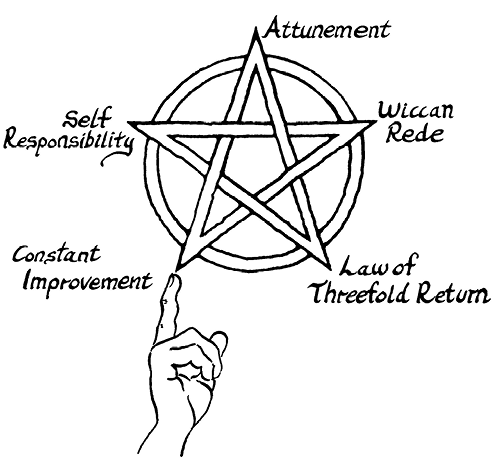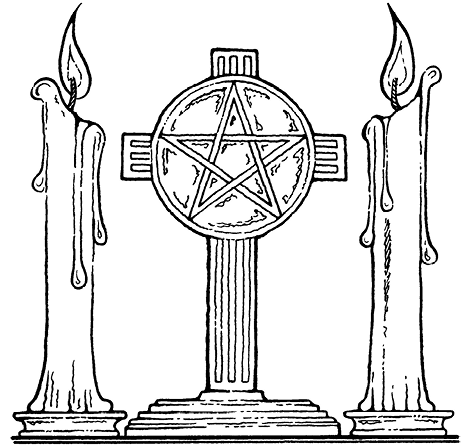Wicca Your Way:
The Eclectic Path
by Autumn Damiana
What is Eclectic Wicca? The joke is that if you ask ten Eclectic Wiccans what they believe, you will get ten answers. This is (hopefully) a playful jab at Eclecticism, but it is partly true. Eclectic Wicca has become an umbrella term for ideals and practices that don’t fall under established Wiccan traditions, such as British Traditional Wicca, Celtic Wicca, or the Dianic Path. It is surrounded by controversy, and everyone seems to have an opinion about it. Critics will even go so far as to say that Eclectics have no place in Wicca at all. But why is this?
To begin, Eclectic Wiccans don’t give much credence to lineage, hierarchy, or a degree system. They usually don’t feel the need to use oathbound material, secrecy, or require coven members to go through the prescribed “year and a day” of training. Some Eclectics may not even follow traditionally accepted Wiccan ritual methods or may interpret teachings differently. One of the most disputed ideas in Eclectic Wicca is that of self-initiation, because some believe that “only a Witch can make another Witch.” Another debated issue is the assumption that Eclectic Wiccans just throw together any aspects of spirituality that they like to create a tailor-made religion.
In an effort to determine exactly what Eclectic Wicca is, I thought it might be best to start by getting an idea of what actual Wiccans and Witches had to say about it. I decided to interview several individuals about their beliefs and practices, and I have included some of their contributions throughout this article. (Please note that all names have been changed and quotes have been paraphrased.)
Interviews of Eclectics by Type
Solitary Eclectic: As the largest group, Solitaries evolved out of necessity before the Internet helped connect far-flung Wiccans with other Solitaries, groups, and covens. However, some are now actively choosing to be Solitary, because it has become its own path and offers self-governance and freedom of choice. Zoe is one such individual. “I’m self-educated in the Craft and began as a Solitary, but now I plan on staying that way. It works for me because I don’t have to depend on anyone else.”

Eclectic Wiccan Witch: “Wiccan” and “Witch” are often used synonymously, especially by Eclectics, who may blend their personal Witchcraft practices with their Wiccan practice. While Alex is a hereditary Witch, he noted, “The Witchcraft that I grew up with in my household could be construed as Eclectic Wicca. At one point I identified as that because I didn’t know what else to call it.”
Eclectic coven member: New covens often advertise as “Eclectic.” Many of these are offshoots of more traditional covens or may contain members from several different traditions. Interestingly, a lot of more recent Eclectic covens are being started by younger Wiccans as a reaction to the strict mentality of their elders. “I was part of an Eclectic coven because I already had a background in Paganism, Druidry, and Witchcraft,” said Jeremy. “Eclecticism was exciting because it offered me the ability to do ritual with a group while still exploring other forms of spirituality.”
Neo-Wiccan: Some believe that there are really only two types of Wicca: British Traditional and everything else that came later—and sometimes the “everything else” is called Neo-Wicca to distinguish between the two. “I left a traditional coven that I had been initiated into as a Third Degree member,” said Kate. “I now identify as a Witch, but I still hold some Wiccan beliefs. Does this make me a ‘Neo-Wiccan’? I don’t like that label, but it may be true.”
Eclectic organizations: Church of Universal Eclectic Wicca (CUEW), Covenant of Unitarian Universalist Pagans (CUUPS), and the Aquarian Tabernacle Church (ATC) are three of the most well-known organizations that some Eclectics belong to. According to Michelle, “I came to Wicca through Christianity. I know that many others have done the same, especially Catholics, but for me it happened in the Unitarian church.”
Mixing Pantheons
Plenty of Wiccans see nothing wrong with mixing pantheons, which may be one of the reasons that they are drawn to Eclecticism in the first place. Nevertheless, the ones I interviewed have a few boundaries. “Do I think that the gods care if I mix pantheons? Not really,” said Michelle. “But I try to work ritual with only one pantheon at a time.”
Jeremy thought that “it probably doesn’t matter if you mix them, but it also keeps you from learning more than offhand knowledge of any particular one.”
Zoe had a more permissive attitude: “Mixing pantheons is frowned upon in more structured forms of Wicca. But if you are not part of a circle that forbids it or you are Solitary, then why not?”
Kate commented, “I think it matters when you are trying to work with pantheons that don’t mesh well. I don’t feel like Odin is going to play nice with Ra.”
Alex chimed in, “This is a question of whether or not you are a ‘hard’ or ‘soft’ polytheist. In that argument, it has more to do with whether or not you think it is disrespectful to the gods.”
Cultural Appropriation
The term “cultural appropriation” describes when someone from one culture adopts something from another culture and often has a negative connotation, especially when a dominant culture absorbs the beliefs and/or practices from one that it has conquered. A perfect example is the dominant Caucasian culture of the United States borrowing from the indigenous Native American culture. However, Kate observed, “This is not a new thing; the pagan tribes of Europe gave way to Christianity, which obviously appropriated their holidays and some of their customs. But no one in our present culture takes this very seriously.”
Jeremy also had this to say: “I would like to think that any spiritual tradition that I’m attracted to should not be dictated by my color, nationality, or race. When I was Wiccan, it was all about being Celtic. My racial ancestors were likely Celtic, but Stregheria really appealed to me even though it had nothing to do with my background.” He went on to say, “It’s possible that I might have a connection to this tradition because of a past-life experience.”
Michelle had this to add: “It is one thing to adopt ideas from another culture, so long as you don’t attempt to claim that culture as your own. You can learn some really beautiful teachings from the Huichol, for example. But don’t go claiming that you’re a Huichol shaman just because you spent five days in the desert taking peyote.”
Eclectic Ethics
The CUEW outlines what they call the “Five Points of Wiccan Belief” on their website. Three of these are fairly self-explanatory ethics: Self-Responsibility, Constant Improvement, and Attunement (to the Divine in everything and the cycles of life.) The other two beliefs, the Wiccan Rede and the law of return (sometimes called the law of three), are recognized by all Wiccans. However, there are, of course, variations.
On the rede, Alex said, “The rede theoretically outlines what Wiccans should and should not do. I take issue over summing up the entire poem in the phrase ‘harm none.’ It’s too reductionist, and it’s not realistic. Plants and animals have to die every day just so we can eat, which is obviously causing harm to them.”
Zoe shrugged and said, “I try to keep the rede in mind, but I always took it as good advice, not commandments.”
Kate agreed. “I believe that every spell I cast does interfere with others’ free will on some level, so I interpret the law of return and the rede a little differently. But this also makes me very, very careful what I attach my energy to. I do believe that ‘what goes around comes around,’ as they say, and it may not even be in this lifetime.” She also adds, “And by the way—that cause and effect principle is not the law of karma. Too many Wiccans go around saying this, and it’s not what karma means.”

Jeremy’s response about the law of return was more blunt: “If you are worried about bad energy coming back to you, then you should take a hard look at all of your intentions and motives. Because if these aren’t good, then I don’t believe that adding a little ‘disclaimer’ to the end of your spell is going to fix anything.” What about the idea that “a Witch who cannot hex cannot heal”? According to Jeremy, “This just means that you should have a good working knowledge of magic, which by itself is not positive or negative. Knowing about hexes is not the same as casting them.”
Alex concurred and added, “Is defensive magic considered a hex? Because if someone is threatening me or mine, I won’t hesitate to protect them, especially on a magical level.”
Opinions on Other Practices
Christian Wicca: This is another very controversial idea among Eclectics. Is it possible to be both Christian and Wiccan? Kate questioned, “Why would you want to? I left traditional Wicca because I found it to be too ‘churchy’ already.”
Michelle smiled and said, “There are Christian Wiccans. I met some in both the Unitarian and Quaker churches. Although, Christianity as they believe it is radically different from everyone else’s. I guess you could say that they are Eclectic Christians?”
Jeremy said, “I can see aspects of Christianity that might fit with Wicca, but you’re more of a Witch if you try to blend these two.”
Alex claimed that “both of these religions essentially contradict each other. There is no good reason to be both.”
Zoe wryly observed, “Most say you can’t be a Christian Wiccan, because Christians believes in their ‘one true God above all others,’ which Wiccans don’t. So the Christians say we are all worshipping Satan. Is Satanic Wicca a thing, then? No, because we don’t believe in him, either. So all this tells me is that if one path is valid, then they both are. Because frankly, Christian Wicca seems just as bizarre to me as the idea of Satanic Wicca.”
Cyber-Wiccan: Zoe said, “Isn’t this just a Solitary with an Internet connection? Whether you are part of an online school earning your degrees or connecting with other Wiccans or even participating in online circles or whatever, you are still a Solitary.”
Chaos magic: “Wiccans can practice Chaos Magic. However, there are also Chaos Magicians, and they have a valid path, but it doesn’t really have anything to do with religion. It has to do with magic,” said Kate.
“Anything goes” view: Alex had this to say: “People have this idea that Eclectic Wiccans read a book or two and then just do whatever the hell they want. If only it were that easy.”
Zoe agreed. “Ours is automatically an initiatory experience because we have to do all the work ourselves, especially as Solitaries. There is no single way in Eclectic Wicca that you can look to for guidance.”
Jeremy pointed out that “most Eclectics ‘go where they are called’ so to speak, so they do cherry-pick from other religions. But isn’t it better that their practices are so meaningful as a result?”

Kate said, “Eclectic Wicca is not for everyone. Even with a coven or group, it’s not the free and easy shortcut that it seems to be. You still have to work hard, study hard, and then forge your own path in the process. But if it weren’t challenging, it might not be as fulfilling, either.”
And last, Michelle concluded, “You can tweak a recipe quite a bit before it changes what you are making. Eclectic Wicca is the same—it allows for adjustments, but it’s still Wicca.”